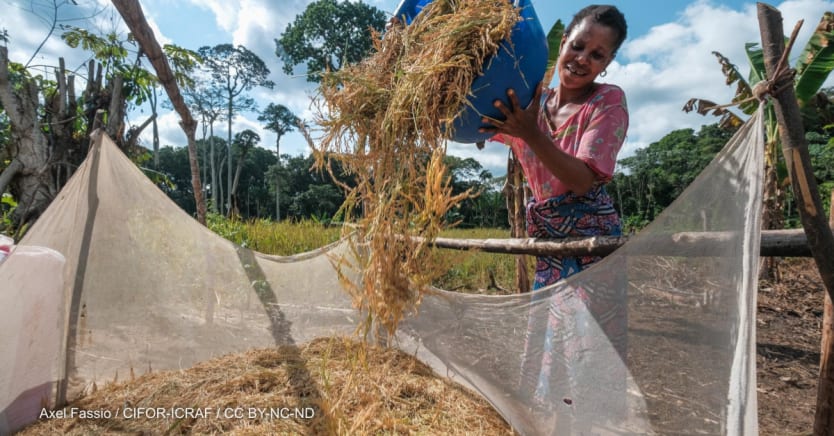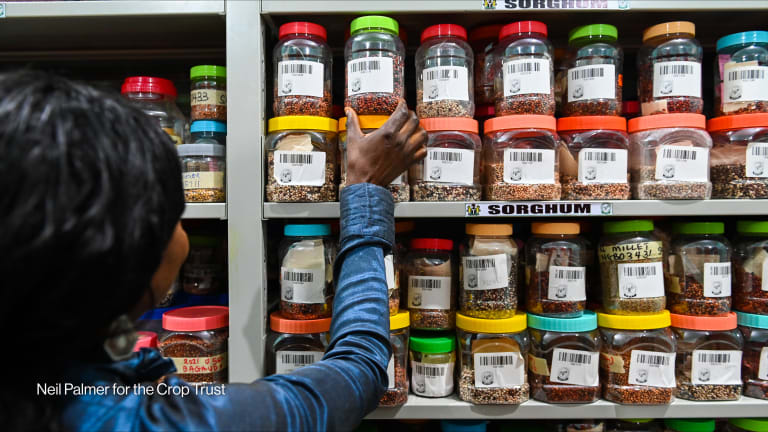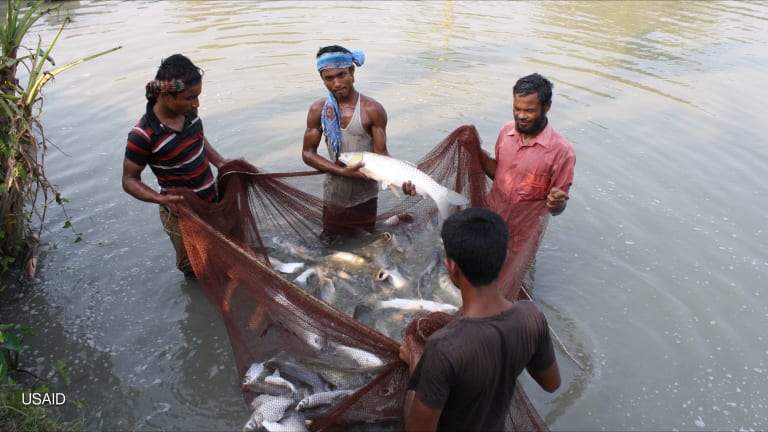
Enock Chikava was raised on a family farm in rural Zimbabwe, growing crops such as maize and rice. His 83-year-old mother still farms the same land, but there is no more rice for her to harvest.
“All the paddies are gone,” said Chikava, interim director for agricultural development at the Bill & Melinda Gates Foundation. “She’s been managing that farm for 60 years, and we’ve seen a lot of changes as a result of climate change.”
Before, three-quarters of the family’s four hectares of farmland would be planted with maize.
“Now it is one-quarter maize and the three-quarters is the other new crops, like millet, like sorghum,” Chikava told Devex. “The farm has totally changed.”
“Diversification hasn’t been the default and it needs to be. We have to enable and promote diversification of production, of consumption, and of trade.”
— Patrick Webb, director, USAID’s Feed the Future Nutrition Innovation LabSmallholder farmers globally are scrambling to adapt their farms as the effects of climate change means rains become scarce and heat waves more intense. But diversifying their crops like his family did can help them weather the changes, Chikava said, ensuring farmers can still have successful yields.
And this isn’t the only benefit of diversification. Russia’s invasion of Ukraine and resulting squeeze on the global wheat market demonstrates the need for the world to be less reliant on staple grains to meet basic caloric needs. Ukraine and Russia together export more than a quarter of the world’s wheat, and the World Food Programme is predicting the number of hungry people will rise by 50 million.
Wheat, rice, and maize make up two-thirds of human caloric intake, despite over 50,000 edible plants being grown around the world.
“You don’t have to have bread to have breakfast … Why are people so worked up about bread?” Chikava said, noting the Gates Foundation is focused on developing other products in Africa such as cassava.
“If your yields are high, your production is high, you can actually substitute a lot of your wheat in a lot of your food products or diets,” Chikava said.
Crop diversification could also help make much-needed strides for global nutrition. Even before the pandemic restricted household incomes and livelihoods, nearly 3 billion people globally had no access to healthy diets.
Countries need to expand what they produce to encourage greater diversification, and affordability, in diets, said Patrick Webb, professor of nutrition at Tufts University and director of the U.S. Agency for International Development’s Feed the Future Nutrition Innovation Lab.
But barriers remain. The biggest one, according to Webb, is changing the mindset of policymakers and donors.
Get the inside track on how agriculture, nutrition, sustainability, and more are intersecting to remake the global food system in this weekly newsletter.
“When there’s a crisis, there’s a default knee jerk response back to ‘oh, we’ve got to address hunger so we’ve got to invest more in productivity of the main crops,’” Webb said. “Well, we’ve been doing that for 100 years and these crises keep happening. Diversification hasn’t been the default and it needs to be. We have to enable and promote diversification of production, of consumption, and of trade.”
There needs to be more promotion of “non-tradeable foods,” crops such as sorghum, millet and teff that may not have an international market but can bolster domestic food security while diversifying diets, he said.
“How can we enhance production and productivity quickly of the so-called non-tradables that many more people in those developing countries could rely on?” Webb questioned.
Much of the agricultural research and development by multinational companies is still focused on staple crops, with 70% of that budget spent on maize, according to Chikava. The foundation is investing heavily on other crops such as cassava, legumes, small grains such as sorghum and millet, and orange-fleshed sweet potatoes, he said. Much of the money is funneled through the CGIAR system of research institutions, and is focusing on development of drought-, heat-, and pest-resistant varieties.
An initiative from the Foundation for Food and Agriculture Research, in partnership with the Global Alliance for Improved Nutrition and the Rockefeller Foundation, seeks to attract more private sector investment in “underutilized” crops to increase dietary diversity and climate resilience. It will award five seed grants of up to $75,000 and then a $1 million challenge grant for the development of a “predictive model that can screen underutilized crops to determine a crop’s usefulness as a source of functional ingredients or nutrients.”
But such research is meaningless if it doesn’t get into the hands of farmers growing the world’s food, Chikava said. Seeds that are engineered to be climate resistant must actually be accessible to smallholders.
Encouraging crop diversification takes time because “you cannot impose things [on] farmers,” Maximo Torero, chief economist at the United Nations’ Food and Agriculture Organization, told Devex.
“You need to provide information, provide opportunities of market access and then bring the investment that is needed for these farmers to decide to produce the commodities more profitable and that are more appropriate to the conditions they have,” Torero said. “We need to move from cereals to a more diversified diet … We need to increase access to healthy diets. And that is why we need to start to think carefully [about] how we can promote that.”
If that isn’t done, global nutrition outcomes are likely to suffer as food prices spike and inflation hits the poorest the hardest, Webb said.
During the 2007-2008 food price crisis, Webb conducted research on nutrient deficiencies in Indonesia where there was a “pretty significant purchasing power crisis” as food and fuel prices soared. People couldn’t buy as much food as before, so there was concern children would become malnourished.
But that didn’t end up happening — children did not lose weight. Instead, mothers were eating less, Webb said, leading to iron deficiency “going through the roof.” The knock on effect was anemic mothers having poor pregnancy outcomes and less productivity as adults, while children also experienced cognitive impairment.
“I fear … we’re going to see both of those things happening again,” Webb said.









